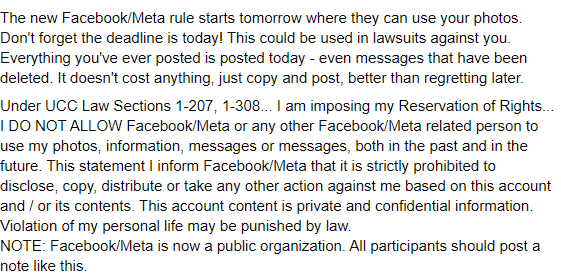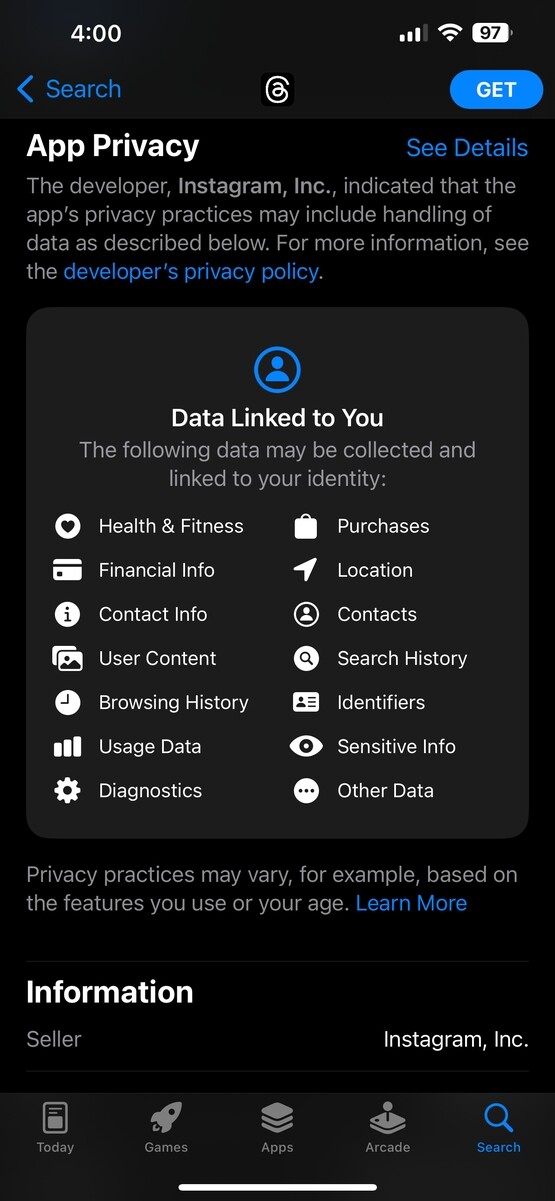- cross-posted to:
- [email protected]
Embrace, extend, extinguish. Only proven way to destroy decentralized, free, open source solutions.
First stage embrace might not even be malicious, but with corporations it will eventually lead to someone thinking: how can we monetize our position. It is just nature how business works.
https://en.m.wikipedia.org/wiki/Embrace,_extend,_and_extinguish
It’s worth pointing out that the wiki article lists several examples of Microsoft using this approach but I wouldn’t class many of them as successful.
Not only was it not very successful, it’s an old outdated Microsoft playbook from the 90s/early 00s and was targeted at closed source competitors and freeware, not open source software where you can just fork out a separate version.
By all means block Meta instances if you want, but they have 3 billion users, they definitely don’t give a shit about a “competitor” with a few hundred thousand users. If simply the presence of a corporation in the Fediverse is enough to destroy it, then it wasn’t going to last long anyways. It’s embarassing that “embrace, extend, extinguish” caught on around here just because it’s a catchy alliteration.
Let me offer a rebuttal. The fact that this playbook even exists and is well-known is a cause for concern. Yes, Microsoft’s campaign wasn’t very successful, but that doesn’t mean Meta won’t try or learn from Microsoft’s mistakes. I ask: is the probability of this happening non-zero, and if so, is it lower than you’re comfortable with? For me, and many others here, that answer is no.
Moreover, this is a greater problem: Meta is well-known and has practically infinite marketing budget. They can spin their app as the de facto, causing many people to lose control of their data. By association, some people will blame the Fediverse and not Meta. Defederating signals that we are not willing to participate with them and tells potential Fediverse users that they will not be able to engage with us—and whatever they decide, we cannot impact more.
The crux of my argument is risk management. Defederated is a conservative measure to prevent possible issues in the future.
Honestly this is just pure paranoia because nobody has given a solid reason as to why they would give a single shit about the few hundred thousand users here. Your only argument is “well it exists, so maaaybe they’ll use it but better” which has no basis. As for losing control of your data, you have no control of your data here. It’s public information. Any person, corporation, computer literate cat, etc can already scrape everything you post here. Don’t mistake anonymity for data privacy.
Like I said, block em, defederate, whatever measures you want to take are an option, but for the love of god let’s just stop parroting nonsense at eachother because it sounds clever. I came here to get away from reddit culture.
I just wanted to say, I am by no means technical but your position is exactly what I was thinking, if an open source project can’t survive when it’s competitors start using it, then it’s never going to survive. The whole point is for it to be interoperable, resilient, and antifragile, and there are plenty of open source projects that achieved that. Competitors switching over to open source is a natural progression of any open source project if one assumes it is successful.
100% agreed with this. The scaremongering just makes no sense.
By all means block Meta instances if you want, but they have 3 billion users, they definitely don’t give a shit about a “competitor” with a few hundred thousand users.
If they don’t give a shit then why do they add federation feature at all? It doesn’t make sense.
Right now it’s only supported for Instagram accounts right? So slap in ActivityPub and you’ve got an already working way to extend your app. It’s easy, it’s fast development, and it’s cheap. It makes tons of sense.
Also, Meta and the rest of FAANG are a company of a bunch of nerds with a history of open sourcing software. This isn’t some crazy play, this is completely normal for them.
Yeah and it’s also normal for them to act like sociopaths and shrug and say “sorry, this is just how capitalism works” when it gets exposed how cynically awful they been behaving.
There is zero evidence ethics will be followed here, Silicon Valley has spent decades building a good argument the precise opposite will happen.
What does ethics have to do with any of this? Like you said, it’s all capitalism. The total amount of users in the fediverse is a rounding error on their 10-K. Why would they care about stealing the userbase?
Corporations don’t act ethically unless they can monetize it or they’re regulated.
Counterpoint: it’s not about capturing the current audience so much as heading a threat off at the pass.
I’m not going to argue way or other re: defederation. Just putting myself in their shoes and looking at the field they’re entering. They likely recognize there’s a brief window right now to capture twitter’s disaffected audience as they stumble while a nontrivial subset of those users are exploring open-source, non-corporate alternatives.
It makes perfect sense for them to cast the widest net they can in this moment. And it also makes sense for them to try to stifle the non-corporate side before it has a chance to gain any solid footing.
Exactly. Which is why I believe that all this fearmongering is because of Meta’s reputation (rightfully so) rather than because Meta actually has a plan to destroy the fediverse. And it’s not the like the fediverse can be actually destroyed, people can always start new instances at any time.
My take was that most people 1) don’t want Meta/Facebook spam - low effort memes, propaganda, etc. and 2) don’t want their content to be used by Meta. The former seems pretty easy - just defederate and you don’t see any of their crap. The second is sort of a gray area… Whether or not you are diametrically opposed to Meta/Facebook or not, once you post your content to a public site, it’s available. I haven’t been here long, but defederation seems to work both ways, so FB would have to scrape content from known instances to get that content unless I’m mistaken.
FB could smoke any instance by DDOSing scrapes whether intended or otherwise, but once you post your data on a public forum, Meta could theoretically use it.
But to your comment - I don’t see what starting a new instance would do for anyone for #2. Any new instance is discoverable by nature, so FB can come knocking at any time for content whether you defederate or not.
- As if Lemmy currently isn’t overrun with low effort memes? Have you seen all those cans of beans running amok here?
- I imagine there are many parties already scraping content from the fediverse as we speak - that’s the nature of public web content.
I’m just here for the beans
As far as (1) goes, 90% of the content on Lemmy is just a Lemmy circlejerk, the remaining 10% is memes. What influx of “low effort content” could possibly make the discussions on Lemmy worse than they already are?
As far as (2) goes, you realize your data on Lemmy is open to everyone to scrape, not just Meta? Every single one of your upvotes is public.
Not only was it not very successful, it’s an old outdated Microsoft playbook from the 90s/early 00s and was targeted at closed source competitors and freeware, not open source software where you can just fork out a separate version.
In Microsoft’s case I agree. However Google successfully used EEE to essentially kill of XMPP where they initially added XMPP support to Google Talk, then extended it with their own features which weren’t up to spec, and then later killed off XMPP support.
So when’s extinguish come in? XMPP still exists, google dropping support didn’t kill XMPP, it just doesn’t work with their app anymore. They weren’t trying to kill XMPP, they were just going what Google does and dropping projects as soon as they aren’t profitable.
Yes XMPP still exists but I’d argue compared to previously standard XMPP is no longer as widely spread. Where as previously you would have people talking to each other over different XMPP services, that kind of federation no longer exists. For example WhatsApp supports XMPP but good luck trying to talk to WhatsApp from another client.
XMPP was never popular to begin with, because it’s a messaging service that relies on the people close to you using it, which was rare before Google Talk integrated. Corporate run apps brought direct and indirect usage, you can’t argue this is an overall loss when they pulled away from XMPP, at worst it’s the same as if they never integrated. The same is true for ActivityPub, whether everyone defederates or blocks Meta instances now or they stop supporting ActivityPub later makes no tangible difference.
I went to university in the 2000s at a smallish German Technical University. Rarely anyone used jabber. What literally everybody in the early 2000s was using was ICQ. Every dorm had ethernet, everybody had a PC and everybody had ICQ running 24/7. The ones not living on campus were peer pressured into getting DSL (which was still uncommon elsewhere).
Then came Facebook, and suddenly all those ICQ contacts were gone. Still, rarely anyone used jabber, only those who didn’t like Facebook. I didn’t know a single person who was on Google Talk.
Then came Android, iOS and Whatsapp, and that’s what „killed“ XMPP, because XMPP was so not ready for mobile networks.
If they don’t give a shit about the fediverse why do they want to join it? Only Facebook can win from this.
Easy integration outside Instagram. They’re rushing to market to head off Twitter and the app only works for Instagram users, way easier to extend that by integrating open source software than rebuilding their own proprietary software from scratch. They can win without destroying it.
Google successfully did this to XMPP.
https://ploum.net/2023-06-23-how-to-kill-decentralised-networks.html
Thank you for this article. It shows exactly what’s Facebook’s plan. They will join in, make their own implementation that doesn’t work well, pass the blame to the other platforms that use the protocol*, which in turn pressures them to debug and slow down themselves around Facebook’s stuff, and then they cut them off entirely.
The correct attitude is to extinguish Facebook now. They’re not welcome.
*And yes, this would work. Users are absolutely gullible about this shit, even without ever being told anything directly. Look at Apple users and their blue/green speech bubble thing. Every single flaw with the system is Apple’s fault - but the dumbass cultminded users see the green speechbubble and blame the other users for the flaws, not Apple. They literally just did the stupid tribalism comic and it worked.
I’m not going to say you are wrong, but I have yet to meet a single fucking person that actually cares about bubble colors.
I hear this parroted so often, but never see it myself. Didn’t see it when all I had used was Android devices, didn’t see it when I tried an iPhone and got involved in their own communities.
Wait, so Apple intentionally made iOS messages highly incompatible with Android users?
XMPP still exists. Google dropped support for it, that’s definitely not killing it. Google drops support for projects all the time by the way, it’s kind of their thing.
Google dropping support for XMPP is what put it one foot in the grave. They abused the protocol to gain the lion’s share of users for Google Talk, and then cut off any resistance that remained. It exists still, technically, but when’s the last time you heard about or used it? I only know about it because EVE Online players used it for large group text communication before Discord became a thing.
XMPP still exists in the same way that critically endangered animals still exist: barely and by the adamant will of some dedicated few.
App I work on, we’re replacing XMPP with messages over push/rest/websocket. XMPP is not fun to use compared to newer stuff.
enthusiast dev here, can vouch, having to make a XMPP library for myself for a bot I ran, I HATE the protocol with a burning passion, it’s weird and not how you would expect it to be. I’m sure the complexity of the standard didn’t help against its downfall. That being said, fully think that it will be harmful in the longrun of Activity Pub for Meta to be jumping in. but there will be some enthusiasts that still use it regardless.
XMPP wasn’t even remotely popular until Google integrated with it, I tried Jabber back in the day lol. Google brought the users it lost, you can’t argue this was an attempt to kill it. At worst it’s the same as before Google integrated.
That’s the problem though. If XMPP had grew organically then it would fare much better. With how it happened, XMPP’s growth was mostly because of Google, and that put a lot of pressure to other servers and the protocol’s development to cater to them, because they had the majority of the users in their platform.
It is absurd to think XMPP would have gained traction without Google. And it is an objectively shitty protocol, so Google dropping it was the right move. It is kind of weird to see people holding up Google dropping XMPP as some horrifying example of embrace, extend, extinguish, when anyone that’s actually developed software with the protocol wants it to die in a burning fire.
This is pure speculation at best, but since we’re speculating I strongly disagree. The internet overall didn’t care about open source software in the early 00s, and most people still don’t today. Corporate freeware that can spend more on a polished product is going to win over the general population every time.
That’s partly because of actions taken by various governments. Who knows what tech would look like today if Microsoft from the 90s forced us all into Internet Explorer.
Also, more successful examples would be Google. They have done this very thing several times but then keep messing it up lol
It looks like articles today are saying that Meta is delaying integrating ActivityPub at launch.
That said, I’m not seeing how we get to the last E, extinguish. By its very nature, ActivityPub is decentralized to avoid total control. So even if Meta embraces the technology and wants to monetize it (because capitalism, of course), extending ActivityPub would (hypothetically) be open source - or they would fork it, diverging and making their version closed, and otherwise not function in full with other ActivityPub instances (like with kbin, Lemmy, and Mastodon). Without buying the platform from the developers in full, I don’t see how ActivityPub or the greater Fediverse dies. And I could just be missing something obvious, so if you can explain how we get there, I would really like to hear and understand.
I guess the only way I could see it is if Threads got so popular that people literally stopped using the other apps - but I also don’t see that happening, because anyone already using stuff like Mastodon are using it because Twitter, Facebook, etc, suck ass and they’ve moved away from sites like that.
EDIT: Thanks to the one person that actually replied, I saw I was on the right track at the end, but failed to see the obvious (as I assumed).
It’s hard to predict but the extinguish part would come from bigger non-Threads instances implementing compatibility with Thread-only extensions (in the interest of their users, or for money) and fragmenting the community. Threads then becomes the defacto ActivityPub standard. Maybe some instances stay true to the standard but with extremely reduced communities because now they can’t see what other instances are publishing. So now you have to decide between your ideals and your social network. At best, you’re back to square 0.
It happens in the extend part.
Large corporation will have much more resources, they will implement features and refactoring, which small open source teams do not have capability to implement. They will start pulling users because they support features that other do not.
This also means that they will start getting control.
And then finally they just cut the communication, and split the community. All the way they can claim to be working “for the community”
It happens in the extend part.
This is it right here.
If you need a real-world example look at the original web browsers:
NCSA Mosaic (the very first web browser) fully supported what would be later known as HTTP verison .9 . There was universal compatibility because there was only one browser supporting HTTP. Later Netscape Navigator would come on the scene and add functionality that was not supported in Mosaic (like the <blink> tag for example), but nothing hugely breaking page views between the two browsers.
Fast forward to Internet Explorer v3, v4 and v5 where MS would not only show all the pages that the prior browsers would, but they EXTENDED by letting HTML still work without following all the same standards. It was easier to write pages for IE than it was to the specification. Then EXTENDED again by MS added ActiveX to web sites meaning now ONLY MS IE could display these pages, and for a time that meant only Windows computers could. This is the Extinguish part.
The “Extend” step gets adopted because its attractive to users.
Here’s a non-computer analogy:
Lets say your current car get 25MPG. Now lets says that Shell come out with a gasoline that would let your same car go 40MPG with zero changes. Just buy Shell gas now at nearly the same price as anyone else’s and you get significantly more range. Most people would do it. Moreover, Shell buys Honda and starts manufacturing cars designed to work on that same new Shell gas could go 60mpg with even more power! So when you go to buy your next car 5 years later after using the gas, you don’t want to turn down 60MPG with more power. That Shell/Honda looks very attractive! All this time all the other gas stations have been going out of business because few people want to pay nearly the same amount for gasoline that only gets a fraction of the range. In the end, ONLY Shell gasoline is being sold, and nearly everyone drives a Shell/Honda to get the most benefit. This is Embrace, Extend, Extinguish.
Took us a while to shake off IE monopoly, only to squander it and now we have chromium (and to lesser extend, WebKit) monopoly. It’s not as horrible as the IE monopoly yet, but we’re currently in the “extend” stage here with Google forcing standard that benefits them and inconveniences their competitors.
but we’re currently in the “extend” stage here with Google forcing standard that benefits them and inconveniences their competitors.
A tiny bit, but I don’t think its the same thing. First, the web runs fine without Chrome. Firefox is proof of that. Second, the source code is Open Source for at least a version of Chrome, so if Google does silly stuff like trying to Extend, we can (and have) make our own version cutting that garbage out and compiling our own.
Yes, but it doesn’t solve browser monoculture issue where webdevs only target chromium/webkit when building their apps, which slowly kill firefox and make it much harder for a new browser engine tech to compete. When other browser engines are dead, the web “standard” will be fully controlled by google. No amount of forking will help because the web consortium is controlled by the big browser makers, and when firefox dies (and mozilla dies), it will be fully controlled by corporation (google), with microsoft and apple playing some minor roles without mozilla because mozilla actually has quite a big influence in the consortium despite its smaller userbase.
I actually witnessed IE’s rise, leaving netscape navigator and opera in dust, and then open source phoenix (later firefox) rising from ashes, steadily taking back user share. Google chrome took a good chunk too and by that time IE was done and desperate enough to give in and use chromium framework.
There was a point in time I thought it’s impossible, the close source monstrosity with neverending standards incompatibilities will stay on quick launchers forever but it did not. What a journey.
Anyone here remembered that Internet Explorer is Evil! site? The person who made that website complained about those tactics such as the ActiveX stuff and also made fun of Microsoft for doing it.
It doesn’t seem at all plausible to me that meta threads will pull users away from mastodon/pleroma/misskey/etc. though. If they “extend” the federation protocol to the point they become incompatible with the rest of these implementations, they will just go away and we’re back to where we were before they started federating.
They don’t pull users away from the competition, they grow their own user base much faster than the competition, the result being that most of the popular content is on their platform. If you want to follow that celebrity/ influencer / news organization/ sports reporter/ politician, you need to join threads.
But that’s already true for Twitter.
And if people weren’t looking for a reason to leave Twitter, we wouldn’t be having this conversation. The point is that this is how decentralized / open standards have been broken and made proprietary in the past.
Dosen’t need to actively “stole” users from the other communities, but if new users have to choose between the independent supported and development instances and the corporate supported with marketing and flashy UI they are going to choose the corporate one. Eventually the great majority of users are under meta’s control and the content is generated there, and you better start complying or get defederated by meta.
Some users will be used to their content by then and may be tempted to move to their platform.
There’s also the tons of news users interested in the Fediverse who get sucked into the marketing of “big tech + Fediverse” and basically just getting slurped up into some inevitable twitter sequel. So it’s existing users and potential new users.
Exactly it’s like selling junk food marketed as health food, you can say it doesn’t stop anyone from eating healthy food but if the junk food is marketed as healthy food (looking at you sugary cereals) than it can steal positive energy from the healthy food movement, gain a false sense of healthiness via associating itself with legitimately healthy food, and distract or disillusion vast swathes of people from actually trying healthy food in the first place.
Techbros being like “we should let tech companies try again (?!?) to make a non-toxic thing out of our idea” is just another case of relatively smart people being dumb af about their privilege because let’s face it, a lot of this is just resume building or a DIY hobby for these folks. They don’t have the same things to lose that trans, black, queer or any other harassed/targeted minority has in coming here. They don’t have a horse in the game whether legitimate communities win or awful corporations do, they still win in the end because both use social media software though the latter pays much better….
i.e.: The IE approach. Take an open standard (HTML), then fill in the gaps it’s missing with proprietary components (ActiveX), wait until your solutions become entrenched, then start doing evil stuff (implementing HTML slightly wrong so that developers have to do extra work to support compliant browsers).
Right, and that’s exactly how IE/Edge is the one globally dominant browser it is today. Oh no, wait, that’s the very standards compliant Chrome
Wow, you really got me there. I had no idea that IE was no longer the dominant browser by usershare. That 13-year stretch of singular dominance may as well have never happened at all since it didn’t literally last forever 🙄
And… yes, Chrome is very standards compliant, isn’t it? Isn’t it great how they publish excellent standards like FLoC & Manifest V3 without any regard for pushback from external vendors & web engineers? It’s a very not evil thing that they’re doing with their very not entrenched product.
Yes, google, the beacon of privacy, has decided to cancel FLoC. See? Google is actually listening to the web community’s plea. What’s that in the latest version of Chrome just released globally a few weeks ago? Ad Topics? No, it’s totally unrelated to FLoC, no need to worry about that, for realsies!
Google argues that it is mandatory that it builds a user tracking and advertising system into Chrome, and the company says it won’t block third-party cookies until it accomplishes that.
The internet is saved thanks to Google’s commitment to pushing forward with new standards
I was struggling to get all the way there initially, but that makes sense. Thanks for actually taking the time to respond!
I doubt that is the plan. The Fediverse is tiny, even after the recent growth. Prior to June it was basically just Mastodon, and I doubt Meta is agile enough to start this from scratch in response to the June growth. This is a lot of effort to take down a competitor that’s widely considered to be rough around the edges, and is only just now hitting 2m active monthly users.
Realistically Threads has been in the works for a while as a way to eat Twitter’s market share while Twitter destroys itself.
I suspect they see value in the ActivityPub protocol in the same way Yahoo saw value in email in the 90s.Regardless of whether EEE is their intention or not, Meta’s presence in the Fediverse is going to have major implications for its long term stability.EDIT: on further reflection, I suspect the value they see is pressuring other would-be competitors to also implement ActivityPub. I suspect they do genuinely want to grow the Fediverse… because doing so would increase the amount of data they could collect and sell from it.
On embrace phase the intention is not malicious, they probably want things to grow. Corporations just in long run will eventually lead to someone asking “how can we capitalize this” and this lead the FOSS part of things to be cut out, and destroying the protocol at that point.
Fediverse should defederate every corporation and just grow naturally.
Big corpos don’t want to take it over, they want it gone.
https://ploum.net/2023-06-23-how-to-kill-decentralised-networks.html
Unpopular opinion but defederating Meta is a terrible idea. What are people thinking will happen? Allow them to federate and you’ll have mastodon users able to view and interact with posts from Threads without needing to be concerned about ads or tracking, without giving over any more control of privacy than they would to any other fediverse instance, and without needing to possess accounts homed within the Meta infrastructure.
Defederate them, and anyone who wants to interact with anyone on threads will most likely need to maintain a presence on both and handover more personal data to Meta than they otherwise would.
Defederating is actively hostile to fediverse users.
The idea is that at first threads.net will seem “normal”, like all the other fediverses
Then they start adding features that either break against other servers, or straight up aren’t supported, making threads.net seem more enticing just because all the neat features aren’t on the other sites.
Think how Internet Explorer killed Netscape with all the Page Load errors caused by ActiveX, yet everyone wanted ActiveX sites.
Once they’ve walked through the path of least resistance and grabbed the bulk of the traffic, they just defederate from everyone.
Yep - best option is to defederate them well before they gain traction & start creating problem by not contributing back to the protocol in a way that benefits everyone.
I think after the community got burned by Microsoft & then google we’re finally learning.
Couldn’t any instance or app do this already? Like #peertube does videos in a way that isn’t necessarily fully federated with #mastodon. We get partial functionality everywhere and some places will have some extra things. If it is popular enough, then add it to the standard and let everyone who wants it add the functionality.
People are concerned about Facebook/Meta trying to Embrace, Extend, Extinguish ActivityPub - if I’ve understood correctly.
People keep saying EEE as if that’s a point in and of itself without really explaining how in this instance
If they become so ubiquitous that all you see are Threads messages, all they have to do is start adding their own extensions to ActivityPub and degrade the experience of everyone who is not using their app.
What kinds of extensions should the typical activitypub user be worried about? I don’t care if Meta adds payments or virtual avatars or whatever–if the core functionality of the Threads app is simple microblogging, it should be perfectly interoperable with that side of the fediverse.
The more likely effect IMO (if Meta holds to their word on enabling federation on their side) is that other large social media companies (e.g. reddit, twitter) will feel pressured to federate and that will make the fediverse better, not worse.
My account is on kbin.social but I’m working on getting kbin self hosted. When I do, I’ll absolutely be federating with Threads whether or not kbin.social does.
A cool post pops up in your feed. You click it. You are met with an overlay that says “Sorry, this post isn’t compatible with your browser. Please log in to Threads.”
Over half your feed are Threads posts.
Speculative example.
Embrace, they join the fediverse seemingly in good faith. Bringing their larger userbase to massively increase the size of the fediverse.
Extend, they add some features that are convenient when interacting with their base across the fediverse. But these conveniences require proprietary software integration.
Extinguish, once enough users and platforms are tied into the conveniences of extend, they use that to force compliance. Stricter and stricter rules on their proprietary software. Comply or die.
The fediverse won’t be gone afterwards, but if it EEE works then we will end up very stifled.
The outcome then would be that Meta’s instance would be defederated/defederate itself - how would that be different from now?
They’d probably attract more people (even people that are here right now) before doing so. Thus creating another centralized platform.
If the Threads product was so superior, and Mastodon so unable to respond that millions would leave Mastodon - sure. I doubt it though…
You’re severely underestimating the budget Meta can throw at this. Mastodon/Lemmy/etc. right now are largely volunteer-run as opposed to full-time employees.
I wouldn’t underestimate them though. After all, they own some of the biggest social network platforms on the globe and have the formula to hook people up down to a t.
While Threads is federated social circles and communities will have time to form. Thread users will by nature of having the support of a corporate juggernaut, be the lions share of users on the 'verse. When threads pull the plug, the Fedverse becomes a ghost town overnight and everyone not on Threads will be forced to migrate if they want to keep their social circles and communities intact.
I think few people would migrate away in that scenario. Some might create additional accounts (none of this is zero-sum). It’s not unlikely that Mastodon itself will become bigger because of it, and it’ll get hard for Meta to unilaterally pull the plug - a bit like email.
Here is an example of a corpo dealing a blow to an open source project. The article covers an example of Microsoft and Google killing a competing open source project(s).
Most comprehensive article on this topic I’ve seen since this Meta shenanigan started. Thanks for the read
You’re acting like there’s only two situations: The entire Fediverse defederates with them, or the entire Fediverse federates with them. That’s not the case.
I, personally, do not want to interact with anyone using Threads, because Meta has a proven history of poor moderation and of manipulating the narrative for political gain on Facebook and I see no reason to think they won’t do the same here. I am not the only one who holds this opinion. Those of us who feel this way can use instances that defederate with them, and have our way.
If you want to interact with them, you can maintain an account on an instance that does federate with them. You do not need to have a Threads account, nor does anyone else.
meta is not here to promote open networks. They will do more harm than good. If you want to learn more about how google achieved it with the XMPP you can read the story here https://ploum.net/2023-06-23-how-to-kill-decentralised-networks.html written by one of the core developers.
This is an interesting article, but I don’t think it’s fair to blame Google for the death of XMPP. Google were the largest consumers of XMPP at one point, sure, but Google was in no way (and never has been) the market leader in communications applications. Google talk came and went, Hangouts came and went and so on. The argument of “When google pulled the plug, XMPP users had to use something else to keep in touch with friends” is equally true of Google messenger users as well. I don’t know anyone that ever exclusively used a Google messenger app, now or then.
Google isn’t entirely innocent here, they definitely didn’t treat the protocol with the respect it deserved, but the development of XMPP was/is fraught with its own problems. I remember setting up an XMPP network for use in a small office as an internal chat tool, it was a nightmare of an experience. Different XMPP Clients had different levels of compatibility with different XMPP servers, many of the clients were just poor overall and the user-experience left a lot to be desired. All we wanted was a simple instant messenger for work, in the days before Slack and Teams. We ended up using OpenFire because it was developed in tandem with Spark, it was basic but worked well for our needs but any time I tried to adopt a different messenger, half the features didn’t work.
I don’t want to interact with anyone on Threads. It is new and it is Facebook.
Was about to say just that. I’ll love to reject people that only follows big corpos.
It isn’t the people. It’s just if I already decided not to use Facebook or twitter. Why would I get back into bed with the devil on an experimental product?
No worries once threads becomes big enough they will defederate from fediverse /s That sure will be hostile to fediverse users.
I doubt they will defederate from the rest of the fediverse. If they reach a dominant position in the fediverse, they can hide behind the fediverse being open to competition to avoid anti trust actions
Meta joining the fediverse is like Raytheon joining anti-war protests. They are not there for sincere participation.
Maybe, but smart tactics means abusing their current good will and shutting them down when. It runs out.
When Thread finally enable federation, just unleash the Lemmy meme community there. We’ll see how fast they roll back the federation feature on their own after their feeds are getting flooded with beans.
THIS IS THE WAY…
They have also already declared that if you federate with them, your instance has to abide by their code of conduct, so they already throwing their weight around.
I think that’s essentially true for any instance, though. You don’t federate with instances you don’t want to.
Strongly disagree here, better to cast them down now while the chance is there. No mercy or quarter provided to Meta considering their track record.
If anyone is foolish enough to go there, let them, but do not drag us towards them.
Some instances will federate and some will block them. It doesn’t have to be all one or the other.
that’s exactly what I was thinking
Lots of naivety here. Big corps only act in their own interest. They view the world in terms of opportunities and threats. Eating Twitter’s lunch is an opportunity. The Fediverse is too small to be worth much today, but someday it might grow up and challenge the status quo. That makes it a threat.
I’m all for federating with them. But give the user the ability to defederate their posts/comments based off their settings. I would rather my information not be supplied to any company owned by Facebook, that’s just me.
The information they could get is already public. That’s how Activity Pub works.
That’s completely fine, but just because a knob can be lockpick doesn’t mean you leave it unlocked.
Granted I have very little experience with activity pub, but I would expect that it should be very possible to have something similar to how defederating Works where if you don’t allow it to be sent to a specific Community it just won’t communicate.
edit: Looking back at it though, it wouldn’t stop them from just opening a secondary instance nobody knows about, having it set to private and then just running it as an info collector I don’t think.
yep, your edit is correct - and is what the previous poster meant by public info
Threads is new - unless you meet someone who for some reason only has a threads account, just talk to them elsewhere.
Otherwise, why is it the Fediverse user who has to get the threads account? Tell your people to make an account elsewhere. If you are conscientiously avoiding threads, you’re probably the only one in the relationship with a principle boundary to cross in this situation.
I agree with you.
Instances can defederate from meta at any point they choose, should it become necessary in the future. Until then, it is a huge boon to the more decentralized parts of the fediverse to get content from where all the “normies” are, as well as giving more visibility to non-meta instances and giving said normies a road to the less data-hungry parts of the network.
Reading material: https://ploum.net/2023-06-23-how-to-kill-decentralised-networks.html
honestly, i think only half-accepting them would be beneficial. it gives meta users a taste of the fediverse but locks them out of a whole bunch of cool stuff that they could have, if they just make an account on one of the instances that they already know because it’s in the half that does federate. we just need to ensure we never repeat xmpp’s mistake: meta users should never be a majority.
i’ll have to discuss this with our admin team, but my initial plan is to defederate meta if usage by them hits 25%. if a critical mass of the fediverse does that, in the worst case we’ll split off from them before taking damage, and in the best case we’ll actively siphon away their user base. (and if any other tech giant enters the fray, we’ll just have to include them in the 25% quota as well.)
update: we discussed the topic and went for an immediate defederation
deleted by creator
it is a huge boon to the more decentralized parts of the fediverse to get content from where all the “normies” are
This is something I can’t understand. There’s obviously no profit motive to push fediverse to everyone, and most content is dogshit.
Can you explain why you find either to be preferable?
Plus, the more entwined threads is with the rest of the fediverse, the harder it’ll be for them to break off. Users will be following Mastodon accounts and posting in Lemmy communities and if Meta does something to break that, they’re the ones that’ll get the backlash, not the fediverse. We’ll just continue along as normal.
Yes exactly
While I think I agree we shouldn 't just defederate them. This is for a user to block them. And if you tell users how they can block them, it will maybe take a bit of pressure away from admins to do it.
During the first wave of Twitter refugees , there was a lot of explaining about ignoring and blocking users. Which can never hurt IMHO. Certainly because it can decrease the load on the volunteers that run an instance
This opinion doesn’t seem unpopular to me.
deleted by creator
I’m with you. What’s the hate with Threads? It’s going to basically just be like another Mastodon instance anyway, right? Just keep using whichever instance you want and Threads will end up adding more content to the fediverse. I don’t really see the downside.
In case you’re wondering why all the down votes, it’s because of this concept:
https://ploum.net/2023-06-23-how-to-kill-decentralised-networks.html
Edit: Heres a summary I had in another post.
Summary:
-
The Fediverse is a decentralized network of servers communicating through the ActivityPub protocol.
-
Large corporations like Google and Microsoft have a history of either trying to control or make decentralized networks irrelevant.
-
Google joined the XMPP federation initially but implemented their own closed version, causing compatibility issues and slowing down the development of XMPP.
-
Eventually, Google stopped federating with other XMPP servers, leading to a decline in XMPP’s popularity and growth.
-
Microsoft used similar tactics to hinder competing projects, such as the Samba network file system and open source office suites like OpenOffice and LibreOffice.
-
The strategy involves extending protocols or developing new ones to deny entry to open source projects.
-
Proprietary formats and complicated specifications are used to maintain dominance in markets.
-
Meta’s potential entry into the Fediverse raises concerns as it could lead to fragmentation and a loss of freedom.
-
The Fediverse should focus on its values of freedom, ethics, and non-commercialism to avoid being co-opted by large corporations.
How a new federated decentralized platform can avoid this fate:
-
Stay true to the principles: The platform should prioritize and uphold the values of freedom, openness, and decentralization.
-
Develop open and robust protocols: Use open standards and ensure the protocol’s specifications are transparent, well-documented, and not controlled by a single entity.
-
Foster a strong community: Encourage collaboration, participation, and diversity within the community to avoid reliance on any single company or organization.
-
Emphasize user control: Give users control over their data and privacy, allowing them to choose which servers and communities to join and ensuring their content is not subject to corporate surveillance.
-
Focus on user experience: Create a user-friendly interface and provide features that attract and retain users, making it easy for them to engage and connect with others.
-
Avoid centralization of power: Design the platform in a way that distributes authority and influence across the network, preventing any single entity from gaining too much control.
-
Promote interoperability: Support compatibility with other decentralized platforms and protocols to encourage communication and collaboration across different networks.
-
Educate and raise awareness: Educate users about the benefits of decentralized platforms, the risks of centralized control, and the importance of supporting independent, community-driven initiatives.
By following these principles, a new federated decentralized platform can strive to maintain its integrity, preserve user freedom, and resist the influence of large corporations seeking to control or make it irrelevant.
Really appreciate the detailed response. Makes more sense why people would be wary of it after reading through that.
My reading of that isn’t that Google killed XMPP, it’s that they thought XMPP would be useful for the userbase they brought in, they realised it wasn’t, and they ditched it. There’s no indication that XMPP had the userbase and lost it to Google, or even that XMPP had features that were stolen by Google
The point is simple, the moment you have the biggest chunk of the userbase, you have more weight in establishing praxis for standards & protocols. In fact, the protocol needs to catch up with you, rather than viceversa. Google did the same with Chrome, for example. Try to start a browser today, and with all the stuff that Google forced into standards and that your browser need to comply with, you will fail. Even just forcing a pace in changes to ActivityPub can mean that a number of tools that are developed by volunteers won’t be able to keep up.
Imagine Meta brings in 100m users. This is a fraction of their userbase, but it is 8x the whole fediverse. Imagine now that they make some change that doesn’t comply with ActivityPub, what do you do, break the tool that is used by the 90% of the users, or adapt? And what if they push changes to ActivityPub, so that everyone needs to catch up quickly: lemmy, mastodon, pixelfed, etc. How soon before some tools with less active development will die because non-compliant? (Similarly to how some browser break with some sites)
For what it’s worth, I agree with your reading, and nobody has described what I consider to be a plausible scenario for how exactly “embrace, extend, extinguish” would actually work here.
I don’t think Meta should be given the benefit of the doubt or anything and people may have differing opinions about the likely user base for Threads, but I don’t think this is any real concern to the fediverse in general.
-
If Meta is running a fediverse instance, they’re doing it for money. Sure, I might be able to block Meta-sourced content from reaching me, but that doesn’t prevent me-sourced content from reaching Meta - where they can monetize it.
Show me how to do that, and I’m on it like white on rice.
@Nougat It doesn’t prevent them now, as they can just easily crawl all of your posts on here because you are posting on a *public instance*. Defederating from them does nothing to make your public content private.
@ninboy No, it doesn’t make my public content private, but it would display my content alongside everything else that a threads user would see, which would make Meta’s product more attractive to threads users. Increased threads userbase means increased ad revenue. Speaking of which, I’m now thinking about how content I created, not on a Meta-operated site, would be (as federation by default intends) displayed next to Meta advertising on their instance. My ability to prevent me-sourced content from reaching Meta’s instance prevents me-sourced content from displaying next to advertisement I don’t want it to be displayed next to.
@Nougat that makes sense, thanks for elaborating on your points. I guess as soon as we put any content out there we can’t prevent screenshots going viral on any context.
@ninboy Sure, you’re not going to close that “analog hole,” but in a case like that, the audience is aware that the content isn’t from the site they’re on. Me- (and you- and everyone-)sourced content appearing on a Meta site as though it was Meta content would carry some things to have real concerns about.
Of course, this is all really new(ish), so it’s possible that a future internet audience will have a better awareness of how federation works, and bring that understanding with them while they browse. On the other hand, have you seen people?
Tangent: You tagged me in your original reply, which made me wonder why, and if I should do the same thing. Checking your username, I see you’re on from mastodon.social, and here I am via kbin.social. I think this is my first real interplatform conversation like that, and I think it’s really cool.
Easy peasy!

Neat, but it still means nothing. You’re still posting in a public forum. You can copyright or watermark your work, but fair use is a two way street.
Neat, but it still means nothing.
I see you’re not well versed in bird law.
There is “messages or messages” in the middle, might want to change that.
Where would this be posted or stored to have legal effects?
Is there a text version available for others to copy?
I printed it out and put it on the front door of my house. The castle doctrine means that this is enforced against all internet companies I use in my house.
You make a good point.
Under the Castle Doctrine laws in my state, if Zuckerberg walked into my house without being invited then I could start blastin.
I’ll post the legalese mumbo jumbo on my door to keep him out, like he’s a vampire.
Where would this be posted or stored to have legal effects?
A different reality.
How is this legally binding? I still remember when people posted similar stuff all over Facebook. It means nothing.
That’s the funny part, it works because […]
This is exactly my concern, I don’t want my online activity to become another revenue stream for meta. If they can put ads next to our posts then we’re back to working for free for the billionaires.
deleted by creator
The issue is the stuff I post being monetized by Zuck et al. I’m not interested in providing free content for billionaires.
If I understand correctly, the concern is not for the users on Meta’s “Threads”. It’s the fact that the content you create on Mastodon or whatever fediverse part with which Meta federated would eventually reach users on Threads, and thus “you” (on the fediverse corner outside of Meta) are indirectly monetized.
Meta should stay away from fediverse!
Yeah, not a fan of the ominous shadow threads™️ casts. I don’t trust them not to flood the fediverse with assorted toxic garbage to push people back towards their walled garden platforms.
The fediverse offers something radical - a new shot at genuine self determination and a socialised, self-governing internet. That shit spells B-A-D N-E-W-S for incumbent platforms (imo) and they’re bad actors in general; they wouldn’t think twice about smothering anything that threatens their short/long term profits. Who’se going to stop them?
Might be a little bit overly risk concious but goddamn. If I were them, I’d be trying to kill alternative ecosystems before they grew - especially if mine (metas) is both trash to use, and be used by.
Even worse, the Threads app is a privacy nightmare

I bet meta really wants to keep track of people in fediverse
What does “Other Data” even cover? Could be literally anything Meta wants
I bet your DNA profile is part of the “other data”. /s
Technically genetic information is covered by ‘sensitive info.’ I’m not joking.
ActivityPub is no more radical than NNTP. Lemmy is almost an exact reimplementation of newsgroups
It will be a reimplementation of usenet when I can turn text into 0 day warez.
deleted by creator
based
Big corpos don’t want to take it over, they want it gone.
https://ploum.net/2023-06-23-how-to-kill-decentralised-networks.html
Lemmy should defederate from threads.net
Same with Kbin. I would honestly go back to reddit sooner than I would accept being smooshed together with Meta.
Otherwise, Meta’s groups could become just another Lemmy instance
deleted by creator
I tried to sign up for this junk and it immediately suspended my account at the end of the sign up process for some reason. Now it’s demanding my mobile number to appeal it.
Get fucked Zuckerberg you tosser.
That seems to be a tactic they use to obtain the pieces of info you didn’t already give them.
Meta jumping on the Fediverse bandwagon would kill it one day. It’s an EEE strategy. We need to keep them out. Defederate from them.
I don’t think so. How would they kill the fediverse? Like there will still many communities that will not federate with Meta and still continue to operate as usual.
I think this is a pretty good read.
I think that article is mostly fearmongering.
Most people using Mastodon right now are not following mainstream people on their feeds - they are mostly following like-minded people who have made the switch from Twitter. If their server decides to federate with Meta, it will actually improve their experience because they can start following mainstream people from the comfort of their Mastodon feed. And if Meta decides to break ActivityPub (which I doubt), it will be back to the original status quo for most users.
And most mainstream people will not be signing up for Mastodon anyways, they will be signing up for Threads/Blue Sky.
@app_priori @jacktherippah I would never put anything past Facebook’s intentions and the reactions of some Mastodon users. I think a good chunk of Mastodon users would still go back to a centralized network and might see Threads as a way to have both worlds … until the other shoe drops.
Well that’s because Mastodon has many shortcomings. Like the search sucks. It’s hard to find people to follow without asking people for recommendations. Mastodon is scarcely a Twitter replacement; it feels like it was built to create extremely insular communities. Like Gab and Truth Social run on Mastodon’s software.
@app_priori I sular communities that can federate. That’s the draw for me, but may not be for others. I think I’m done with a Twitter-like experience but I know a lot of other Twitter “refugees” just will not roll with the new experiences. And recreating somewhere where news and information can be diseminated. I mean it seems like it would be an easy technical problem to solve and I’m surprised that it hasn’t happened already.
Anyways lol I’m rambling
I really hope the fediverse can block out the meta crap…
This is Microsoft’s playbook, https://en.wikipedia.org/wiki/Embrace,_extend,_and_extinguish, it was use by Google to kill off XMPP - https://www.disruptivetelephony.com/2013/05/did-google-really-kill-off-all-xmppjabber-support-in-google-hangouts-it-still-seems-to-partially-work.html, now it will be used by Facebook to try to kill the Fediverse.
Why is this not more widely talked about? Please share this.
i’ll join the voices saying this is bad for the fediverse, and bad for users in general. there are LOTS of normie users who are joining threads who will be shut off from learning about all the cool other servers if everyone blocks them. this will mean users who want to interact with them need to sign up on Threads, which is what we don’t want.
what we want is that users on Threads see other servers, learn that they’re better, and migrate over.
don’t block Threads, show them how much better we are.
Has lemmy.world blocked meta?
Spontaneous idea of how to use copyright law for keeping Meta out of the Fediverse (more for fun):
Introduction: Parts of the Fediverse, including Mastodon, are software licensed under the APGL license. This license is a great choice because it forces the ones running the software to grant users access to the source code. GPL for example would allow to run proprietary services based on GPL code. The AGPL does not. Companies like Meta and Google will likely not use AGPL code because it might force them to also publish their proprietary systems behind the scenes. However, this does not help much for keeping the Fediverse save. They simply implement their own software which will not be open source.
Therefore we may need another approach. Defederating is the simplest and in my opinion currently the best. It’s easy and keeps people in control.
However, there could be some ‘automatic’ approach using copyright law. It’s a hack which allows to use existing law to regulate the way instances can federate.:
- instances would Federate only if the other side can provide a certain piece of information called X
- X is protected by copyright law, therefore by default, instances are not allowed to provide X
- However, X is released under a license which for permits to copy and distribute X under certain conditions
- The conditions allow to tune who can legally federate
- Conditions could be
- The server software must be AGPL licensed
- The instance must not be owned by a company with a certain amount of annual revenue
Open question is, who owns the copyright of X?
Do you really need to import a CSV just to block a single domaine? Sounds over complicated






































